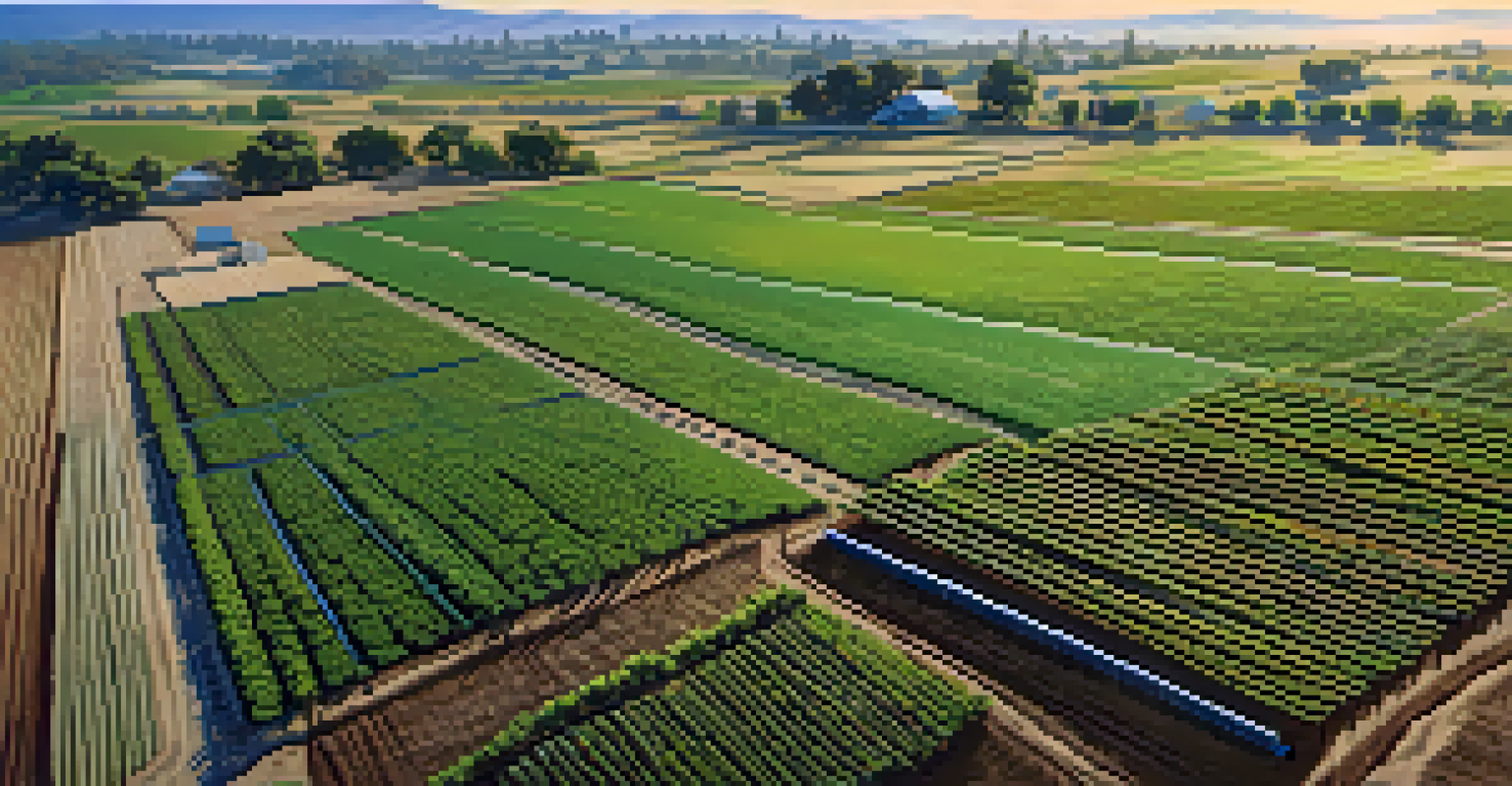California's Role in Shaping Sustainable Farming Technologies

Introduction to California's Agricultural Landscape
California is often referred to as the agricultural heart of the United States, producing a significant portion of the country's fruits, vegetables, and nuts. With its diverse climate and rich soil, the state has long been a leader in farming practices. However, with increasing environmental challenges, the focus has shifted toward sustainable farming technologies that not only preserve the land but also enhance productivity.
The future of agriculture is sustainable, and we must lead the way with innovative practices that respect our environment.
The Golden State's unique agricultural features, such as its extensive irrigation systems, have paved the way for innovative farming techniques. Farmers here are increasingly adopting strategies that prioritize both efficiency and sustainability. This commitment to responsible farming is crucial, as it reflects a growing awareness of the environmental impact of traditional agricultural methods.
As California navigates the complex interplay between agriculture and environmental stewardship, it sets a precedent for other states and countries. The lessons learned here could provide valuable insights into how sustainable practices can be integrated into farming on a larger scale.
Innovative Water Management Techniques
Water scarcity is a pressing issue in California, prompting farmers to adopt innovative water management technologies. Techniques such as drip irrigation and rainwater harvesting are becoming commonplace, allowing farmers to use water more efficiently. These methods not only conserve water but also improve crop yields, demonstrating that sustainability and productivity can go hand in hand.

Additionally, the use of sensors and smart irrigation systems enables farmers to monitor soil moisture levels in real-time. This data-driven approach allows for precise water application, reducing waste and ensuring that crops receive exactly what they need. By leveraging technology in this way, California farmers are setting an example for sustainable water use in agriculture.
Innovative Water Management in Farming
California farmers are adopting advanced techniques like drip irrigation and smart sensors to conserve water while enhancing crop yields.
These advancements are not just beneficial for the environment; they also help farmers save on costs, which is crucial in an industry where margins can be tight. As California continues to innovate in water management, it provides a model for regions facing similar challenges across the globe.
Embracing Organic Farming Practices
California has been at the forefront of the organic farming movement, with a significant number of farms certified as organic. This shift away from synthetic pesticides and fertilizers is a key component of sustainable agriculture, promoting soil health and biodiversity. Consumers are increasingly seeking organic produce, which has only fueled the demand for these practices.
Sustainability in farming isn't just a trend; it's a necessity that ensures food security for generations to come.
By embracing organic methods, farmers are not only responding to market trends but also contributing to a healthier ecosystem. Organic farming enhances soil fertility through crop rotation and cover cropping, which can mitigate erosion and improve water retention. These techniques illustrate how sustainable practices can lead to a more resilient agricultural system.
Moreover, California's strong regulatory framework and support for organic certification have helped farmers transition to these methods. As a result, the state has become a beacon for those looking to adopt organic practices, inspiring farmers nationwide to follow suit.
Technological Advancements in Crop Monitoring
The integration of technology into farming has transformed how crops are monitored and managed. Drones equipped with imaging technology allow farmers to assess crop health from above, identifying issues like pest infestations or nutrient deficiencies early on. This proactive approach not only saves time but also minimizes the need for chemical interventions.
In addition to drones, precision agriculture tools such as satellite imagery and soil sensors are gaining traction in California. These technologies help farmers gather critical data on crop performance and environmental conditions, enabling them to make informed decisions. With the right information at their fingertips, farmers can optimize inputs while minimizing waste, leading to more sustainable practices.
Leadership in Organic Farming
The state's strong regulatory support has positioned California as a leader in organic farming, promoting healthier ecosystems and meeting consumer demand.
As California continues to push the envelope in agricultural technology, it paves the way for a future where data-driven decisions become the norm. This trend not only enhances productivity but also aligns with the overarching goal of sustainability in farming.
Research and Development in Sustainable Agriculture
California is home to several leading agricultural research institutions that focus on sustainability. Universities and organizations are collaborating with farmers to develop innovative solutions tailored to the state's unique challenges. This research is vital in finding new ways to improve yields while reducing environmental impact.
One area of focus is developing drought-resistant crop varieties that require less water and can thrive in changing climate conditions. By investing in research and development, California is positioning itself as a leader in sustainable agricultural innovations. These efforts not only benefit local farmers but also contribute to global food security.
Moreover, partnerships between academia, government, and the agricultural industry foster knowledge sharing and the dissemination of best practices. As these collaborations continue to flourish, California's role in shaping sustainable farming technologies will only grow stronger.
Policy and Regulation Supporting Sustainability
California's commitment to sustainable farming is reflected in its policy landscape. State regulations often encourage environmentally friendly practices, providing incentives for farmers to adopt sustainable technologies. Programs that promote conservation, renewable energy use, and soil health are examples of how policy can drive change in agriculture.
Moreover, California's stringent environmental laws have set a benchmark for other states to follow. These regulations not only protect the environment but also push farmers toward innovation, as they seek to comply while remaining competitive. This dynamic creates a fertile ground for sustainable farming practices to thrive.
Technological Advances in Agriculture
The integration of drones and precision agriculture tools is revolutionizing crop monitoring, allowing farmers to make data-driven decisions for sustainable practices.
As the state continues to champion sustainability through legislation, it reinforces the idea that responsible farming can coexist with economic viability. This forward-thinking approach is essential for the future of agriculture, both in California and beyond.
Community Engagement and Education in Farming
Engaging local communities in sustainable farming practices is crucial for long-term success. California has numerous initiatives aimed at educating both farmers and consumers about the benefits of sustainable agriculture. Workshops, farm tours, and community-supported agriculture (CSA) programs help bridge the gap between producers and consumers, fostering a culture of sustainability.
By involving the community in discussions around sustainable practices, California farmers can build trust and support for their initiatives. This engagement not only enhances the local food system but also empowers consumers to make informed choices about their food sources. When consumers understand the impact of their choices, they are more likely to support sustainable practices.

Moreover, educational programs targeting youth can inspire the next generation of farmers and advocates for sustainable agriculture. By instilling values of environmental stewardship early on, California is ensuring a continued focus on sustainability in farming for years to come.